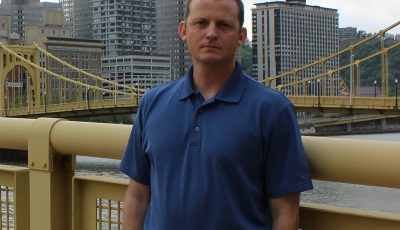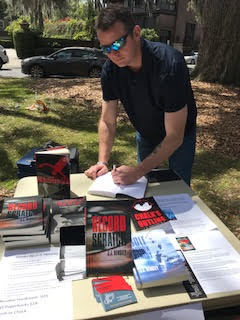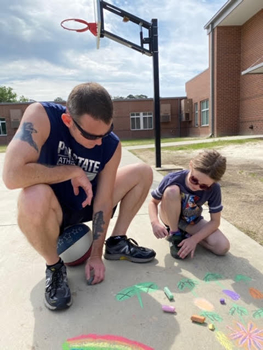

Up Close: J. J. Hensley
Law Enforcement Background Infuses Authenticity into Thrillers
 By Wendy Tyson
By Wendy Tyson
I’d been looking forward to J. J. Hensley’s new Trevor Galloway thriller for some time, and it doesn’t disappoint. Hensley, no stranger to police work, infuses his books with a realism that’s compelling. Add a novel premise, tense action from page one, and incredibly high stakes, and THE BETTER OF THE BAD is a book that will grab you immediately—and one you’ll read more than once.
In this interview for The Big Thrill, Hensley discusses THE BETTER OF THE BAD, his background in law enforcement, and his unusual writing process.
Former Pittsburgh narcotics detective Trevor Galloway returns in your latest novel, THE BETTER OF THE BAD, a fantastic thriller with an exciting premise. Tell us a little about this book. What inspired this storyline?
I usually look to structure my books in unique ways or at least develop storylines that readers have never come across. I’d been struggling with finding a hook for this particular book once I’d set my mind to starting it, which was particularly frustrating because I was on a long furlough from my day job. For once in my life, I actually had time to write, but the big idea that would usually hit me was nowhere to be found. During what was probably my 10th needless drive back from the hardware store, an ambulance and a few fire trucks passed me on the road. No big deal. Happens all the time, right? And then, while I was stopped at a stop sign, it hit me. Dispatchers. 9-1-1. A killer calls 9-1-1 and kills people the dispatchers know at exactly 9:11 p.m. From there, the plot elements took shape, I started my research, and it all came together relatively quickly.
Galloway’s a talented detective who continues to grapple with his own personal issues, including mental health concerns. These issues impact his detective work and, in some ways, drive the plot. Without spoilers, how do events in this book push Galloway in ways that cause his character to grow or change—personally or professionally?
Out of the protagonists I’ve created over the years, Trevor Galloway is my favorite. While writing this series, I had to make a decision whether I was going to let Galloway remain stagnant or let him evolve with each book. I decided to let the stories change him, and it has affected the way he approaches cases. Where in the past he’s been one with a short fuse, now he’s one with… well, a short-ish fuse. In this book, he’s the ultimate reluctant hero because he knows his full participation in a case can be detrimental to himself and those he cares about. However, he may not have much choice in the matter.
The book begins in Pittsburgh, Pennsylvania, a locale that’s special to you, and ends up in Savannah, Georgia. Why those cities?
Most of my books have been set in or around Pittsburgh, where I lived for many years. However, I moved to the Savannah area a couple of years ago, so it seemed natural to have Galloway make the trip with me. Fortunately, both cities are absolutely fantastic settings for books. Pittsburgh, having relinquished its old industry image for the biotech and finance movements, is a city of transformation and rebirth while Savannah is a town that maintains hold of the past as tightly as a drowning man grasps a lifeline. The contrasts are beautiful and startling.
Did you have to do any special research to write this novel?
Although I have a background in law enforcement, I had to do quite a bit of research on how emergency communications functioned in the Savannah area. Every jurisdiction and region can handle things differently, so I wanted to make sure to get as many details right as possible. In addition to talking to people in and around the local police departments, I did quite a bit of reading regarding call volumes, response times, and the history of the communications operations in the area. Additionally, the book delves into local politics, so I had to become well-versed in how many county and city offices functioned.
Speaking of research, often crime writers have to spend copious amounts of time doing police research to nail the details in their books. You, on the other hand, have an interesting background, including police work and years as a Secret Service Agent. How does your prior experience inform your books, especially this one?
It’s interesting because people often think I have a huge advantage when it comes to writing crime fiction because of my background. However, I still have to keep up with my research because technology and methods change at such a quick pace. When I was a police officer, we didn’t have computers in our cars or carry tasers. When I was a Secret Service agent, personally owned drones, which can be a security concern, didn’t exist. Times change, and if you get lazy and assume you know the subject matter because you were trained in it years ago, you make huge mistakes on the pages you write.
What does your writing process look like?
I’ve got a full-time job, a kid in elementary school, I write and speak quite a bit about police reform, and at the time of this writing we are dealing with a global pandemic. My “process” looks like a Rorschach test that’s been left in the rain for a week.
THE BETTER OF THE BAD has been called a “real rush with a gripping mystery at its heart” by author Nick Kolakowski. Indeed, you are a master at writing fast-paced crime fiction. I couldn’t turn the pages quickly enough. What advice do you have for authors interested in writing compelling crime fiction?
The story you’re writing should play out like a movie in your head—soundtrack and all.
What’s next for you?
I’m working on a standalone mystery that will touch on elements of reincarnation. If you want to know how fast it’s coming along, I’ll refer you to the above answer on my writing process.
- Up Close: Tosca Lee and Marcus Brotherton - May 2, 2023
- Up Close: J. T. Ellison - February 28, 2023
- Up Close: J. J. Hensley - September 30, 2020



